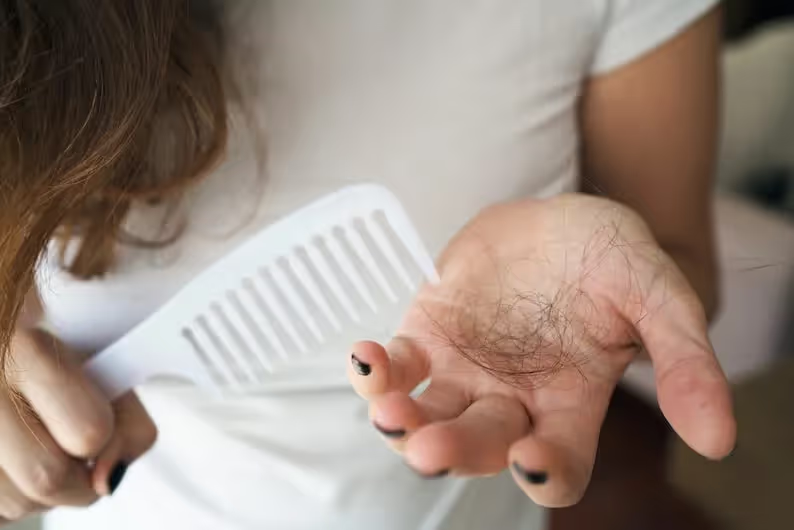As we age, it's not uncommon to notice changes in our hair. You may find that your hair is thinner, more brittle, or that you're losing more strands than before. Hair loss is a natural part of aging, but it can still be a distressing experience, especially when it impacts self-esteem and confidence. Understanding senior hair loss and learning how to manage it can help you feel more in control of your hair health.
Why Do We Lose Hair as We Age?
Hair loss with aging is a widespread issue, affecting both men and women. But why does it happen?
- Hair Follicles Stop Producing Hair follicles, the tiny pockets in the skin where hair grows, slow down their production over time. As we get older, these follicles may stop producing new hair altogether. This is why some older adults notice their hair thinning or even balding in certain areas. When hair follicles stop producing hair, it leads to thinning hair and a gradual reduction in hair volume.
- Age-Related Hair Loss One of the most common types of hair loss in seniors is age-related hair loss, where hair strands gradually thin and fall out over time. This is a natural process that is influenced by genetics,hormonal changes, and the aging of hair follicles. While it's normal to lose hair as we age, it doesn't make the experience any easier.
- Female Pattern Baldness Women, like men, can experience hereditary hair loss. For women, this is known as female pattern baldness or female pattern hair loss. This common type of hair loss is usually characterized by thinning at the crown of the head rather than a receding hairline, which is more typical in men. In both cases, this type of hair loss is driven by genetics and hormone levels, which can cause hair follicles to shrink, leading to thinner hair strands.
- Hormonal Changes Hormones play a major role in hair growth and loss. Changes in hormone levels, particularly as women age and experience menopause, can contribute to female pattern hair loss. Lower levels of estrogen, which helps maintain hair growth, can lead to thinning hair or hair falling out more rapidly.
- Nutritional Deficiencies As we age, we need to ensure we're fueling our bodies with the nutrients needed to maintain healthy hair.Nutritional deficiencies, such as a lack of vitamins and minerals like iron, vitamin D, and biotin, can weaken hair and lead to more hair loss. This can be particularly common in seniors, as absorption of nutrients can decrease with age.
How to Manage Hair Loss and Promote Growth
While age-related hair loss is natural, there are ways to manage thinning hair and potentially slow the process.
- Be Gentle When You Wash Your Hair Overwashing or using harsh shampoos can strip your hair of its natural oils, leading to dry, brittle hair that is more prone to breakage. When you wash your hair, choose mild shampoos and conditioners that are specifically designed for thinning or aging hair. Washing hair too often can also cause unnecessary stress to your scalp, so aim for a gentle routine that keeps your scalp healthy without drying it out.
- Choose the Right Hair Products Many hair products designed to support aging hair are available. Look for shampoos, conditioners, and treatments that contain ingredients like biotin, keratin, and other nourishing vitamins. These products can strengthen hair strands and promote healthier growth. It's also wise to avoid hair products with harsh chemicals, as these can damage your hair and scalp over time.
- Address Nutritional Deficiencies Healthy hair starts from the inside out. Nutritional deficiencies can significantly contribute to hair loss. Make sure you're getting enough of the key nutrients that support hair growth, including iron,vitamin D, and omega-3 fatty acids. If you're unsure whether your diet is providing all the nutrients you need, consult with a healthcare provider who can recommend supplements or dietary changes.
- Consider Medications for Hair Growth Some people may benefit from medications that promote hair growth or slow down hair loss. For example, minoxidil (Rogaine) is an over-the-counter treatment that can help with thinning hair. Finasteride (Propecia) is another medication that doctors may prescribe for hair growth, though it's typically for male pattern baldness. Always consult with a healthcare professional before starting any new treatment.
- Try Scalp Massages Scalp massages can stimulate blood flow to the hair follicles, which may encourage hair growth. Regular scalp massages using essential oils like rosemary or peppermint can also help nourish your scalp and keep your hair follicles healthy.
- Stay Hydrated Dehydration can weaken hair strands and make them more prone to falling out. Drinking plenty of water each day supports overall health and keeps hair hydrated from the inside out. When you lose hair, it's important to give your body what it needs to maintain healthy, hydrated hair strands.
When to See a Doctor
If you're experiencing significant hair loss or notice that your hair is falling out in patches, it's important to consult with a healthcare provider. Certain medical conditions, such as thyroid problems or autoimmune disorders, can cause sudden or extreme senior hair loss. In these cases, treating the underlying health condition may help slow or reverse the loss of hair. While senior hair loss is a common experience, it doesn't mean you have to give up on your hair's health. By understanding why hair follicles stop producing hair and how to take care of thinning hair, you can manage hair loss in a way that makes you feel confident and empowered. Stay patient and remember that taking care of yourself, inside and out, is key to maintaining healthy hair at any age.




